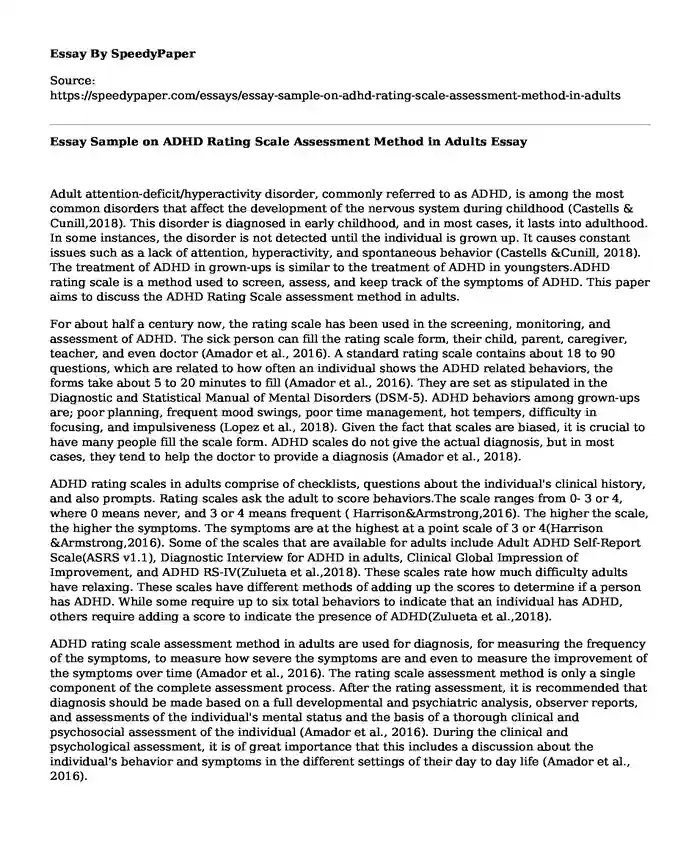
| Type of paper: | Essay |
| Categories: | Psychology Psychological disorder |
| Pages: | 4 |
| Wordcount: | 872 words |
Adult attention-deficit/hyperactivity disorder, commonly referred to as ADHD, is among the most common disorders that affect the development of the nervous system during childhood (Castells & Cunill,2018). This disorder is diagnosed in early childhood, and in most cases, it lasts into adulthood. In some instances, the disorder is not detected until the individual is grown up. It causes constant issues such as a lack of attention, hyperactivity, and spontaneous behavior (Castells &Cunill, 2018). The treatment of ADHD in grown-ups is similar to the treatment of ADHD in youngsters.ADHD rating scale is a method used to screen, assess, and keep track of the symptoms of ADHD. This paper aims to discuss the ADHD Rating Scale assessment method in adults.
For about half a century now, the rating scale has been used in the screening, monitoring, and assessment of ADHD. The sick person can fill the rating scale form, their child, parent, caregiver, teacher, and even doctor (Amador et al., 2016). A standard rating scale contains about 18 to 90 questions, which are related to how often an individual shows the ADHD related behaviors, the forms take about 5 to 20 minutes to fill (Amador et al., 2016). They are set as stipulated in the Diagnostic and Statistical Manual of Mental Disorders (DSM-5). ADHD behaviors among grown-ups are; poor planning, frequent mood swings, poor time management, hot tempers, difficulty in focusing, and impulsiveness (Lopez et al., 2018). Given the fact that scales are biased, it is crucial to have many people fill the scale form. ADHD scales do not give the actual diagnosis, but in most cases, they tend to help the doctor to provide a diagnosis (Amador et al., 2018).
ADHD rating scales in adults comprise of checklists, questions about the individual's clinical history, and also prompts. Rating scales ask the adult to score behaviors.The scale ranges from 0- 3 or 4, where 0 means never, and 3 or 4 means frequent ( Harrison&Armstrong,2016). The higher the scale, the higher the symptoms. The symptoms are at the highest at a point scale of 3 or 4(Harrison &Armstrong,2016). Some of the scales that are available for adults include Adult ADHD Self-Report Scale(ASRS v1.1), Diagnostic Interview for ADHD in adults, Clinical Global Impression of Improvement, and ADHD RS-IV(Zulueta et al.,2018). These scales rate how much difficulty adults have relaxing. These scales have different methods of adding up the scores to determine if a person has ADHD. While some require up to six total behaviors to indicate that an individual has ADHD, others require adding a score to indicate the presence of ADHD(Zulueta et al.,2018).
ADHD rating scale assessment method in adults are used for diagnosis, for measuring the frequency of the symptoms, to measure how severe the symptoms are and even to measure the improvement of the symptoms over time (Amador et al., 2016). The rating scale assessment method is only a single component of the complete assessment process. After the rating assessment, it is recommended that diagnosis should be made based on a full developmental and psychiatric analysis, observer reports, and assessments of the individual's mental status and the basis of a thorough clinical and psychosocial assessment of the individual (Amador et al., 2016). During the clinical and psychological assessment, it is of great importance that this includes a discussion about the individual's behavior and symptoms in the different settings of their day to day life (Amador et al., 2016).
Conclusion
In conclusion, the Rating scale assessment method is used to screen, evaluate, and monitor ADHD. The forms are filled by either the individual being assessed, close family members, a teacher, or a doctor. The ADHD symptoms in adults include hot tempers and mood swings. There are different rating scales for adults, and they use different ways to calculate the presence of ADHD. However, given the fact that the rating scale assessment method is subjective, it is vital to have more than one person fill the form. It is paramount that the whole assessment process is applied for the rating scale to be effective.
References
Amador-Campos, J. A., Nuno, L., & Gomez-Benito, J. (2016). The Conner's Adult ADHD Rating Scales-long self-report and observer forms: Validation of the Catalan version. Journal of Psychopathology and Behavioral Assessment, 38(2), 209-215.
Castells, X., BlancoSilvente, L., & Cunill, R. (2018). Amphetamines for attention deficit hyperactivity disorder (ADHD) in adults. Cochrane Database of Systematic Reviews, (8).
https://scholar.googleusercontent.com/scholar?q=cache:V5kDUDvxSLUJ:scholar.google.com/+ADHD+IN+ADULTS&hl=en&as_sdt=0,5&as_ylo=2016
Harrison, A. G., & Armstrong, I. T. (2016). Development of a symptom validity index to assist in identifying ADHD symptom exaggeration or feigning. The Clinical Neuropsychologist, 30(2), 265-283.
Lopez, P. L., Torrente, F. M., Ciapponi, A., Lischinsky, A. G., CetkovichBakmas, M., Rojas, J. I., & Manes, F. F. (2018). Cognitive-behavioral interventions for attention deficit hyperactivity disorder (ADHD) in adults. Cochrane Database of Systematic Reviews, (3).
https://scholar.googleusercontent.com/scholar?q=cache:EZr9pILB6mMJ:scholar.google.com/+ADHD+IN+ADULTS&hl=en&as_sdt=0,5&as_ylo=2016
Zulueta, A., Diaz-Orueta, U., Crespo-Eguilaz, N., & Torrano, F. (2018). Virtual Reality-based Assessment and Rating Scales in ADHD Diagnosis. Educational Psychology, 25(1), 13-22.
https://scholar.googleusercontent.com/scholar?q=cache:O1xNy4zvXv8J:scholar.google.com/+ADHD+rating+scales&hl=en&as_sdt=0,5&as_ylo=2016
Cite this page
Essay Sample on ADHD Rating Scale Assessment Method in Adults. (2023, May 29). Retrieved from https://speedypaper.net/essays/essay-sample-on-adhd-rating-scale-assessment-method-in-adults
Request Removal
If you are the original author of this essay and no longer wish to have it published on the SpeedyPaper website, please click below to request its removal:
- Free Essay for You: Disorganization and Social Learning Theories
- Personal Work Goals Essay Samples
- Employee Motivation - Free Essay in Human Resources Management
- Free Essay about Threats in Conflict
- Essay Sample on Propaganda Used in Animal Farm
- Essay Example - Weakening Marriage Rates
- Essay Example - More About Divorce in America
Popular categories




